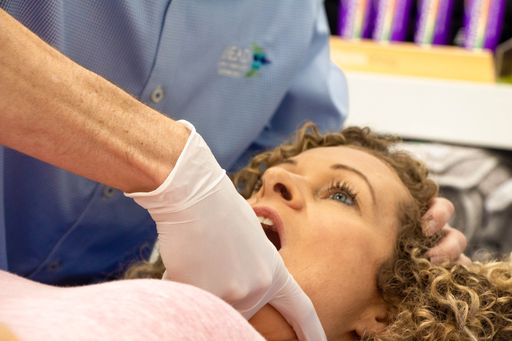Bruxism is the term given to any night-time tension in your jaw, resulting in clenching or grinding of your teeth during sleep. People who “brux” can end up with jaw pain and headaches as well as other jaw symptoms such as clicking, ear ache or jaw locking. People who may find themselves clenching or grinding at night-time invariably also find themselves clenching their jaws during the daytime as well.

Whilst this clenching/grinding is often attributed to stress, there are also other theories as to how and why this might develop. For example, young people as young as 2 years old often grind their teeth, which may be more of a way of “discovering” their teeth and getting used to their natural bite during the night. There is a strong association between bruxism and people with airway issues such as obstructive sleep apnoea, so in some circumstances there may be other issues that lead to bruxism other than stress. For some people, “parafunctional habits” (such as chewing gum, biting their nails, biting the end of a pencil), may be their form of clenching, all of which can put unnecessary strain on your jaw joint.
Physiotherapy and your Jaw
Physiotherapy aims to address bruxism in a few ways:
- Reduce the daytime clenching. Whilst the night-time clenching may be an uncontrollable habit, the daytime clenching can be overridden with conscious awareness, relaxation exercise, and jaw muscle retraining to reduce unwanted tension. In some people it’s as simple as stopping biting their nails! Believe it or not, a person’s posture can also have a direct impact on the tension in their jaw.
- Loosen and relieve the tight muscles. Physiotherapists use manual techniques, including massage, to loosen and stretch overactive, tight jaw muscles. These techniques can be done externally, or (with a glove on for comfort and hygiene) internally inside the patient’s mouth. Some of these strategies can also be taught to patients so that they can perform self-management. Ice packs and/or heat packs can also be beneficial.

- Address the neck! Having a tight/sore neck is often associated with jaw tension and bruxism. With treatment to address any neck stiffness, we find that most patients experiencing jaw symptoms improve more significantly than with just jaw treatment alone.
- Consider other factors. For some people, reducing the daytime clenching and loosening the tight muscles is enough to bring significant relief of their symptoms. For others, however, we may need to also look at any other factors that might be contributing. These might include:
- any recent dental treatment,
- significant stress in a person’s life,
- other medical conditions, especially anything involving their airways
If any other major issues are identified, other treatment in conjunction with physiotherapy can often be more effective. Other treatment options can include medications, psychology, dental input (including splints designed to protect the teeth, or to help open the airway), botulism toxin (botox) injections and other relaxation strategies (such as meditation, breathing techniques and massage).
If, upon reading this, you would like to learn more about managing your jaw pain, you can see one of our TMJ physiotherapists by making an appointment by phoning 07 5437 8899, or by booking online here: